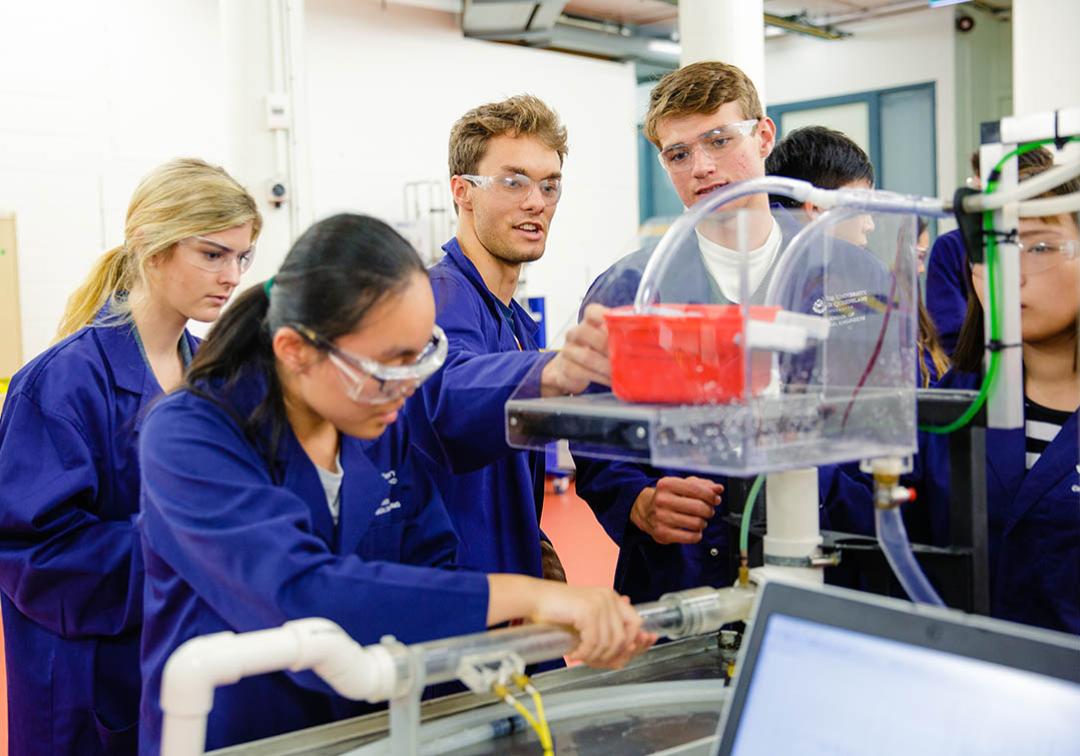
Master of Bioengineering (Professional)
Overview
Solve bio-related challenges facing our society by producing chemical building blocks, therapeutical drugs (biopharmaceuticals), tissue-engineered organs, biocompatible materials, food and beverage products and bioenergy.
Bioengineering creates the opportunity to solve health and environmental problems.
As our ability to modify and control biological systems increases, biological processes are replacing chemical and mechanical processes due to their inherent advantages of renewable resources, mild operation conditions and minimal waste problems.
In this Masters program, you'll learn from the new discoveries used in biology and medicine. Discover how the rapid developments in the field of synthetic biology and its associated methods, including more widely available gene editing techniques, have substantially increased our capabilities for bioengineering.
This program will enable you to become an accredited engineer and highly sought after by industry.
Program highlights
- Gain insight from the best specialists from various disciplines and utilise your expertise and skills to enhance the quality and longevity of human life.
- Develop your ability to understand, manage and deliver complex professional projects.
- The Master of Bioengineering (Professional) is provisionally accredited by Engineers Australia.
How you'll learn
Your learning experiences are designed to best suit the learning outcomes of the courses you choose.
- Lectures
- Tutorials
- Research experience
- Laboratory work
- Fieldwork
What you'll study
At UQ, degrees are called 'programs' and subjects are called 'courses'. Here's a sample of the courses you could study in this program:
- Metabolic Engineering
- Bioprocess Engineering
- Biomaterials: Materials in Medicine
- Cell and Tissue Engineering
Career possibilities
Postgraduate study can take you anywhere. Here are some of the careers you could be on your way to:
- Biomedical engineer
- Bioprocess development engineer
- Biopharmaceutical engineer
- Biotechnologist
Average annual salary range
Biomedical Engineer
seek.com.au
Professional memberships
When you graduate, you may be eligible for memberships with the following professional organisations. Contact the organisation to find out how to become a member.
- Engineers Australia
Program accreditation
The Master of Bioengineering (Professional) is provisionally accredited by:
- Engineers Australia
Events
See all events
29 June - 6 July
Year 11 Queensland Chemistry Winter School

29 June
Queensland Biology Winter School, Year 12

1 July
International Baccalaureate Research Skills Program
Stories
See all stories
UQ people
Renee's PhD story: exploring how ‘jumping genes’ disrupt early development
5-minute read

Study tips
UQ science scholarships to help fund your studies
8-minute read
Stories
See all stories
UQ people
From firefighting robots to rocket science: Vennkkata’s UQ experience
5-minute read

UQ people
Renee's PhD story: exploring how ‘jumping genes’ disrupt early development
5-minute read

Study tips
UQ science scholarships to help fund your studies
8-minute read
Entry requirements
Entry requirements
To be eligible for entry, you'll need:
- a 4-year bachelor's degree (or equivalent) in a relevant engineering discipline (see below), or
- a 4-year bachelor's degree in engineering (or equivalent) which includes all of the relevant discipline content (see below), or
- to have successfully completed 3 years of study towards an approved qualification at an overseas partner institution, with a formal pathway to the Master of Bioengineering (Professional).
You must have a grade point average (GPA) of 5.0 on a 7-point scale in your previous qualification.
- a 4-year bachelor's degree (or equivalent) in a relevant engineering discipline (see below), or
- a 4-year bachelor's degree in engineering (or equivalent) which includes all of the relevant discipline content (see below), or
- to have successfully completed 3 years of study towards an approved qualification at an overseas partner institution, with a formal pathway to the Master of Bioengineering (Professional).
You must have a grade point average (GPA) of 5.0 on a 7-point scale in your previous qualification.
Relevant disciplines for previous qualifications
Relevant disciplines include chemical engineering, chemical engineering and technology, process engineering, bioengineering, bioprocess engineering, and biochemical engineering.
If your bachelor's degree in engineering was not awarded in these disciplines, you must have successfully completed all of the following discipline content in your tertiary studies:
- advanced/higher/engineering mathematics
- statistics
- programming
- chemistry/reactions
- biology
- transport and transfer
- thermodynamics and mass and energy balances
- and at least 1 of the following:
- separation process technology or unit operations
- process control
- process design
English language requirements
IELTS overall 6.5; reading 6; writing 6; speaking 6; listening 6. For other English Language Proficiency Tests and Scores approved for UQ
TOEFL iBT (including Paper Edition) - Overall 87, listening 19, reading 19, writing 21 and speaking 19.
PTE Academic - Overall Score of 64 and 60 in all sub bands.
BE - A minimum overall grade of 4 plus a minimum grade of C in all macro skills.
CES - Overall 176 and 169 in all sub bands.
OET is not accepted.
There are other ways to meet the English language requirements. For some programs, additional conditions apply.
Inherent requirements
To complete this degree, you have to meet its inherent requirements by demonstrating essential skills and attributes. Read the inherent requirements before you apply.
Student visas
International students who are accepted into full-time study in the Master of Bioengineering (Professional) are eligible to apply for an Australian student visa (subclass 500).
There are a number of requirements you must satisfy before a visa is granted, including the Genuine Student (GS) requirement.
Need help meeting the entry requirements?
Fees and Scholarships
Indicative annual fee
Approximate yearly cost of tuition (16 units). Your fees will vary according to your selected courses and study load. Fees are reviewed each year and may increase.
$9,540
2026
Approximate yearly cost of full-time tuition (16 units). Your fees will vary according to your study load. Fees are reviewed each year and may increase.
AUD $58,056
2026
Government assistance
Financial aid
As an international student, you might be eligible for financial aid – either from your home country, or from the Australian Government.
HECS-HELP
Domestic places in the Master of Bioengineering (Professional) are Commonwealth supported, as long as you meet all Commonwealth supported place eligibility requirements.
This means the cost of your education is shared between you and the Australian Government. Instead of tuition fees, Commonwealth supported students pay what are called student contribution amounts.
If you have a Commonwealth supported place, you may also be eligible for HECS-HELP. This is an Australian Government loan scheme to assist eligible students with the cost of their student contribution amounts.
Centrelink support
The Australian Government offers a number of income-support payments to eligible Australian university students.
Scholarships
You may be eligible for more than 100 scholarships, including:
How to apply
Applying online
All international applications should be submitted to UQ. If you prefer, you can use an approved UQ agent near you.
The program code for the Master of Bioengineering (Professional) is 5761.
Applying online
All domestic applications should be submitted to UQ.
The program code for the Master of Bioengineering (Professional) is 5761.
Important dates
The closing date for this program is:
- To commence study in semester 2 - May 31 of the year of commencement.
- To commence study in semester 1 - November 30 of the previous year.
Visa processing times vary. Apply and accept your offer as early as you can.
To learn more about UQ dates, including semester start dates, view the Academic Calendar.
Important dates
The closing date for this program is:
- To commence study in Semester 1 - January 31 of the year of commencement.
- To commence study in Semester 2 - June 30 of the year of commencement.
To learn more about UQ dates, including semester start dates, view the Academic Calendar.
Aboriginal and Torres Strait Islander applicants
For support with applying – or if you have any questions about university life – get in touch with our Aboriginal and Torres Strait Islander Studies (ATSIS) Unit.
Explore other programs
Express yourself. And your interest.
They say choosing a degree is hard, which is why we've made it easy. Register your interest and we'll send you everything you need to know about applying to UQ.


